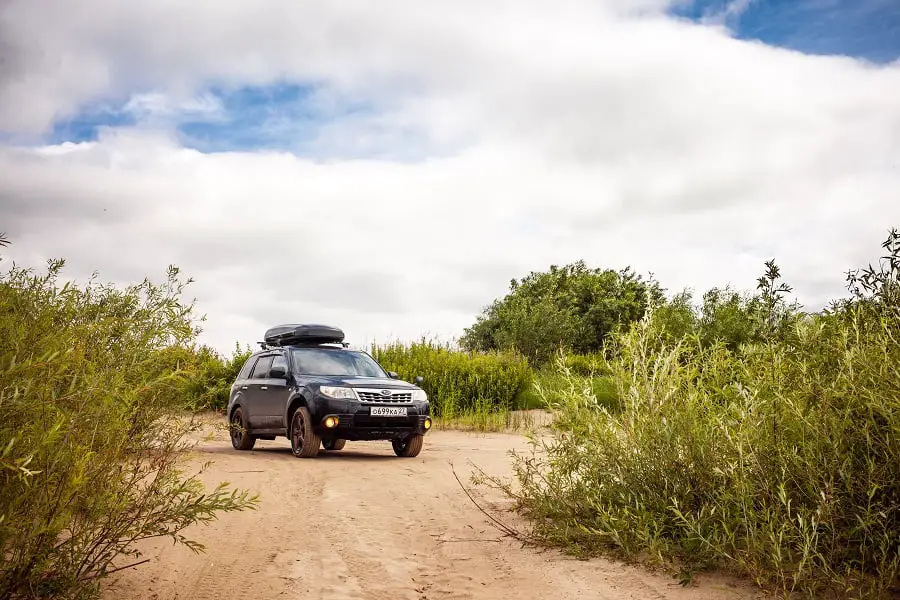
SUVs are a popular choice for overlanders. They have the power, size, and comfort to handle any trip thrown at them. Let us talk about and draw some comparisons why SUVs are perfect for overlanding trips.
Let’s get into it.
6 Reasons Why an SUV is a Great Overland Vehicle
The SUV has long been a durable and successful off-road vehicle. As we will see, there are many reasons why an SUV makes for a great overland vehicle. Here are six.
- On-Road Drivability
- Fuel Economy
- Capacity to Carry Gear
- Affordable Pricing
- Availability of Parts
- There is Already Enough Demand
So, let’s take a closer look at the SUV and why it is truly great for overlanding.
SUV and Overlanding
The SUV is one of the most popular vehicles in the world. Some believe they are overkill for daily driving, while others swear by them. It all depends on your perspective, but if you’re looking to build an adventure vehicle that can take you anywhere with confidence, there’s no better choice than a beefy four-wheel drive sport utility vehicle (SUV).
It seems everyone wants an SUV these days. The popularity of jacked-up machines is at an all-time high, and it doesn’t look like that trend has any plans on dying out. Thanks to availability, affordability, gas mileage concerns, and just plain old-fashioned practicality, bigger vehicles have never been more popular.
We’re not sure what started this rush for rubber room cars, but it has become so mainstream that even the smallest SUVs are considered mid-sized off-road capable vehicles.
For those not in the know, “Overlanding” is a subculture of vehicle-based camping where adventurers travel far from civilization to wild destinations via whatever means they choose.
Now with that definition in mind, don’t assume that all SUVs are created equal. There are significant differences between the types of vehicles designed for overlanding, and it’s essential to understand them when choosing your next car.
SUV versus Sport Utility Vehicle?
What? Isn’t it the same?
First off, let’s distinguish the difference between an SUV and a Sport Utility Vehicle. The two terms seem interchangeable, but there is a bit of a distinction between the two depending on what part of the world you reside in.
In North America, an “SUV” is generally used to refer to any significantly sized vehicle with four-wheel drive. In contrast, an American market Sport Utility Vehicle is usually reserved for truck-based 4WD models.
European marketers tend to define an SUV as any car-based 4×4 and a Sport Utility Vehicle as a truck-based 4×4. To make things even more complicated in the UK, an SUV is called an “off-roader,” and not all off-roaders are SUVs.
Pickup Trucks: A Better Alternative?
Pickup trucks have also entered the overlanding picture, and while they may seem like the perfect choice at first glance, there are some pitfalls you should think about when considering one for your next big adventure.
First off, if you’re thinking of getting something like a Tacoma or Tundra TRD model, understand that it’s not designed to handle extreme terrain, which is what overlanding demands. Dragging stuff around, living out of it, and trying to get by on stock suspension will be a tough ride, and it’ll cost you plenty of time and money to build one for overlanding duty.
Secondly, not every place on the planet is set up for dealing with big trucks like these. Thanks to their superior torque and ground clearance, they can get around, but they won’t do so without leaving an impression. There’s also the fact that having this kind of vehicle draws more attention than we usually want, depending on where we go.
Choosing an Overlanding Vehicle
Before deciding on what type of vehicle you’re going to purchase, ask yourself several questions:
What is my overland adventure goal? Your answer to this question should be the main deciding factor when choosing a vehicle. Overlanding can be as extreme as you want to make it, and your choice of car will reflect that.
Do you want an off-road capable truck or SUV because you plan on making some serious overlanding trips in places like Baja, where those machines reign supreme? Are you looking for something more moderate, like a Tacoma, which can still make light trails but is designed for something else?
For most people who just want to get outside and explore the world, a small SUV is best and easier to work around than a larger truck-based model.
What Kind of Budget Do I Have?
Affordability is usually the biggest issue for people looking for their first overland machine or those just looking to do more. For that reason, smaller SUVs are the most affordable option, but if you want something larger with a higher seating position, trucks may be your best choice.
There are plenty of choices out there, so there will be something for you whether you have a $10,000 or $100,000 budget.
What Type of Usage Am I Planning On?
Understanding how the vehicle is going to be used should also help guide you in your decision process. Are you planning on making tons of off-road trails where ground clearance is essential? Are you planning on carrying around lots of cargo or having several people come along for the adventure?
This all affects what kind of vehicle is best suited for your needs.
Reasons Why SUV’s are Great Overlanding Vehicles
So, as to what’s explained above, SUVs have a real advantage in general. Perched at the top SUVs are the go to overlanding vehicle, here’s why:
1. On-road drivability
The last thing I want is for my off-roading vehicle to be complicated or unsuited to everyday life on the street. This means it should have good gas mileage, comfortable seating and steering, and easily accessible creature comforts like air conditioning, sound system controls, and USB ports.
I don’t want to have to give up my commute to head out for an adventure. I need a vehicle that can do both. The SUV is ideal for this task. Any of them even come with all-wheel drive as standard equipment and automatic transmissions, making them day carver supreme.
2. Fuel economy
Fuel economy isn’t such a big issue when you’re driving on the highway, but finding gas can be difficult and expensive when you’re away from metropolitan areas, so fuel efficiency becomes more important.
Especially in developing countries with no infrastructure for delivering cheap gas as we enjoy here in America (in some places, it has gotten so bad that locals go hunting for gas during civil wars).
Luckily, modern SUVs are more efficient than ever before, with most mid-sized models getting over 20 mpg on the highway and some even achieving impressive 30+ mpg figures. Many of these are four-wheel drives, which adds to their off-road capability without hurting mileage.
3. Capacity For Gear
The SUV is king regarding loading capacity in cargo room and people carrying ability (many models seat seven passengers). This makes them perfect expedition vehicles where you’ll need to have lots of equipment or even take family members along for the ride.
There’s no other vehicle that offers this much space at an affordable price. Plus, many SUVs come with valuable features like roof racks, allowing you to carry bulky items up top.
4. Affordable Pricing
When it comes to adventure vehicles, price is usually the most critical factor for most people. Good 4x4s aren’t cheap, and there’s no getting around that fact, but if you’re looking for a good overlander that won’t break the bank, the SUV has got to be near the top of your list.
You can get entry-level models to start at below $25,000, including standard all-wheel-drive (AWD) and an automatic transmission (a true rarity in off-road capable cars). For perspective, aftermarket conversions for trucks can easily cost $30k or more, so you can save a lot of money by buying new ones.
5. Availability Of Parts
This is especially true in more remote areas where finding replacement parts for vehicles can be difficult or even impossible. Even if you’re lucky enough to find the right part, you’ll have to drive hundreds of miles back to town to get it installed, which saves valuable time and money.
With an SUV, that’s not an issue since they typically have few interchangeable parts with other vehicles on the market (the exception being some cars like the Toyota FJ Cruiser), making it easier for mechanics everywhere from Nepal to Mali to get their hands on the right part without unnecessary delays.
6. There Is Already Enough Demand
If you’re going to be creating a business out of your overlanding adventures, then the chances are that you will want a vehicle already in demand. SUVs may not be as popular as soccer Moms and road trippers taking their three kids to school, but they have been gaining popularity over the years with those who seek remote adventures.
The truth is that there are plenty of businesses out there building custom modifications for SUV’s so if someone wants something done, it will probably get done through one of these companies or individuals building off-road capable SUVs.
Final Thoughts
SUVs are significant for a reason. They were initially built as workhorses that could transport people and goods across rugged terrain. Of course, some modern-day off-roaders fall into this category but not many. The point is you can make an SUV very capable off the road. It’s just whether you want to take the risk knowing you will hurt the car or not!
So there you have it, reasons why choosing a trusty SUV is the go-to for overlanding vehicles. They’re affordable to buy and maintain, offer good on-road drivability and fuel economy, and have enough space and carrying ability for all the equipment you might need for a multi-week expedition. What’s not to like?
If all else fails, an SUV will always look cool cruising around town with a purpose!

